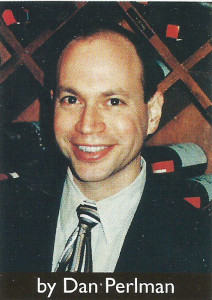The Magazine for Restaurant Professionals
March/April 1997
Page 15
Remember the 80s?

Dan Perlman is the Wine Director at Felidia Ristorante in New York City, a columnist and food and wine editor for Q San Francisco magazine, and a private chef
Caviar, foie gras, truffles and champagne went from movie screen fantasy to daily fare at the diner down the block. Drinks that were rack became call and then top shelf. Top shelf itself came into being and proliferated on every bar back. Tips were as big as the drinks themselves. A sommelier needed knowledge of little more than the five first growths, DRC, Gaja and maybe how to lever out a cork. If the Court of Master Sommeliers had based their exams on a true “need to know” basis, we’d have thousands of MS’s running around the country.
Everyone was spending money on becoming a foodie or trendy drinker. Doctors, lawyers, bankers, professors and anyone else with a professional title were using corporate credit cards to satisfy the slightest culinary craving. Even the file clerk down the hall had an expense account.
Welcome to the 90’s. Tax reform and economic trends have stripped those magical sign-now-pay-later phantasms from all but the top echelon. The question has gone from “what vintage Bordeaux?” to “what bargain Merlot?” Cellar management has become an exercise in breadth rather than depth and sales have gone from a snap of the corkscrew blade back to the art of diplomacy.
But the top stuff still sells. Who’s buying it? The one class of professional that has the leveraged financing to pull it off is still ordering. The one class that retains those mystical expense accounts are investment bankers – young, hotshot, generally but not always male, looking for that meteoric rise in income, knowing that it won’t last, but enjoying life’s pleasures while it does.
Now, I preface the next bit with the caveat that this is a generalization. (Any investment banker who is quite sure he or she doesn’t fit this description, please consider yourself an exception.) Let’s face it, as wine buyers, we’ve all attended auctions and seen prices skyrocket as guys with too much cash pay outrageous sums based on vintage charts from their magazine of choice. We’ve all had one who ordered a bottle from the right-hand side of the page without a clue as to its content and then announced to his friends at the table what he was paying for whatever he was getting. High school locker room-size comparisons just change form, they don’t go away.
I give you, however, a particular evening. It was a typical night. A party of four late-twenty-somethings popped in, the host a weekly visitor, each time with a new trio in tow. Without fail, our leader ordered his usual bottle of ‘76 Lafite. I presented the bottle for his inspection, and, as always, presented it to each of this evening’s friends so that they could see what he had bought for them to toss down after a couple rounds of martinis. As I served the bottle, I quietly mentioned to the young gentleman that this was the last in our cellar. He stopped the conversation at the table with a wave of his hand and asked me when I intended to get more. I said, regretfully, that it was unlikely that any more was available for our purchase. Without a pause, he slammed his fist on the table and shouted, “Do you know who I am?! Call the factory and have them make more!”
Santé is a glossy format trade magazine for restaurant wine buyers and educators. I wrote as a freelancer for them on and off from the first issue in November 1996 until November 2002 when they decided to stop using freelance writers.